PHA101O - Analyzing Ethical Violations: The Case of Rude Ruby
VerifiedAdded on 2023/03/31
|6
|991
|360
Essay
AI Summary
This essay examines the ethical conduct of Ruby, a pharmacy technician, at SOS Pharmacy, focusing on her potential promotion and the ethical considerations surrounding it. The manager evaluates Ruby's work habits, noting her tardiness, disrespectful behavior towards patients (including labeling a patient as a heroin addict), and irresponsibility (refusing to help with stocking drugs). The essay analyzes these actions in light of ethical principles such as beneficence, non-maleficence, and respect for persons, concluding that Ruby's behavior violates these principles. Her actions, like filling the wrong prescription, demonstrate a lack of diligence and potential harm to patients. The essay ultimately supports the manager's decision to deny Ruby the promotion until she rectifies her conduct and adheres to the code of ethics.
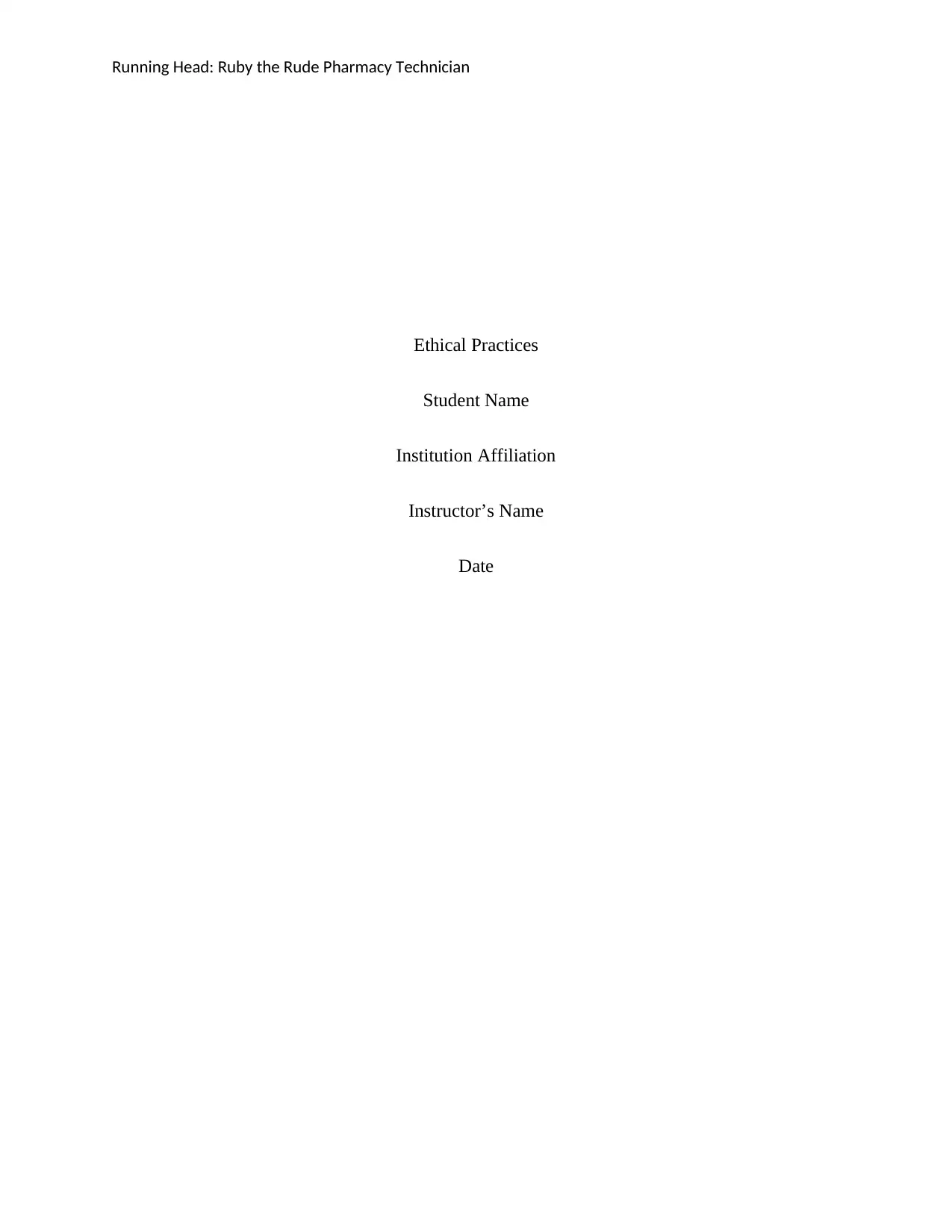
Running Head: Ruby the Rude Pharmacy Technician
Ethical Practices
Student Name
Institution Affiliation
Instructor’s Name
Date
Ethical Practices
Student Name
Institution Affiliation
Instructor’s Name
Date
Paraphrase This Document
Need a fresh take? Get an instant paraphrase of this document with our AI Paraphraser
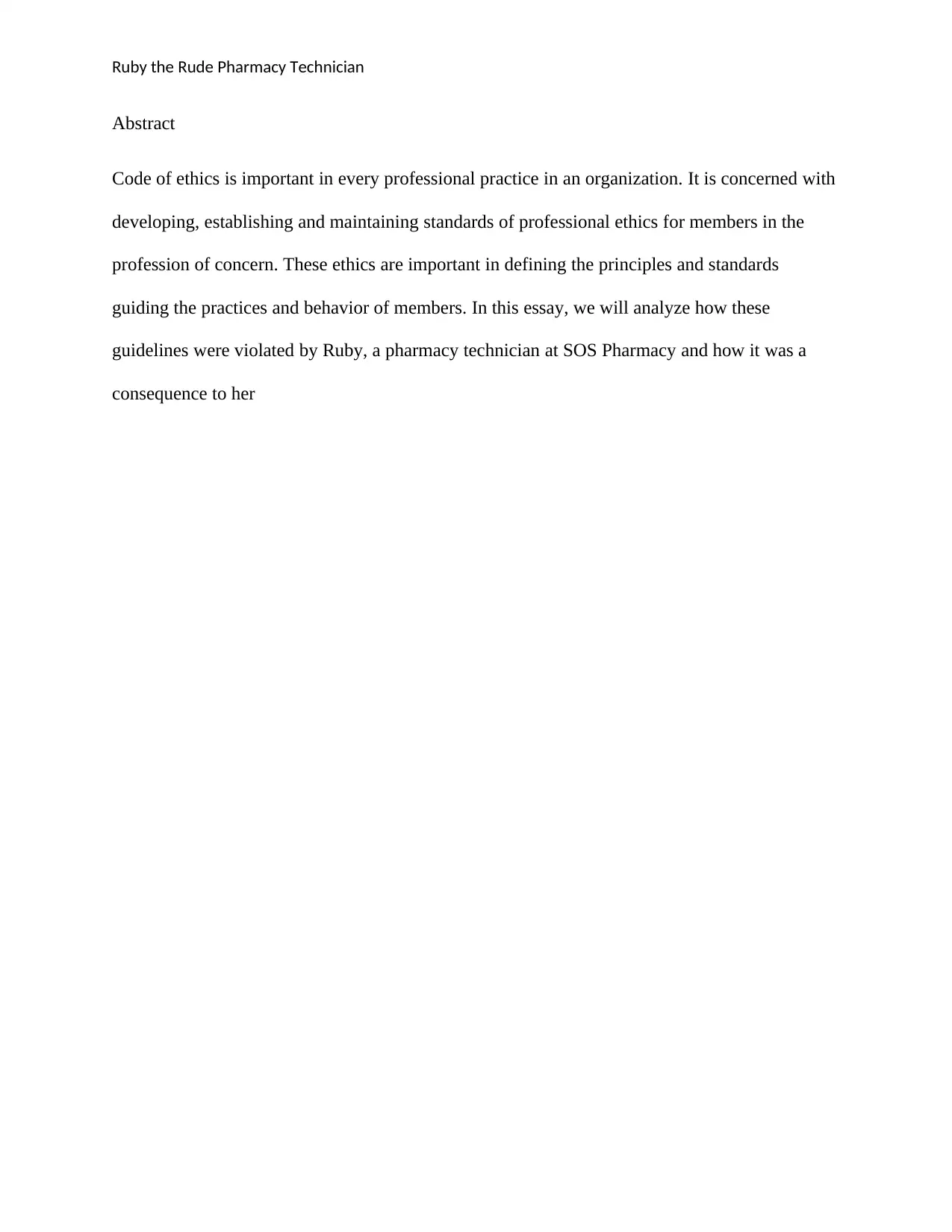
Ruby the Rude Pharmacy Technician
Abstract
Code of ethics is important in every professional practice in an organization. It is concerned with
developing, establishing and maintaining standards of professional ethics for members in the
profession of concern. These ethics are important in defining the principles and standards
guiding the practices and behavior of members. In this essay, we will analyze how these
guidelines were violated by Ruby, a pharmacy technician at SOS Pharmacy and how it was a
consequence to her
Abstract
Code of ethics is important in every professional practice in an organization. It is concerned with
developing, establishing and maintaining standards of professional ethics for members in the
profession of concern. These ethics are important in defining the principles and standards
guiding the practices and behavior of members. In this essay, we will analyze how these
guidelines were violated by Ruby, a pharmacy technician at SOS Pharmacy and how it was a
consequence to her
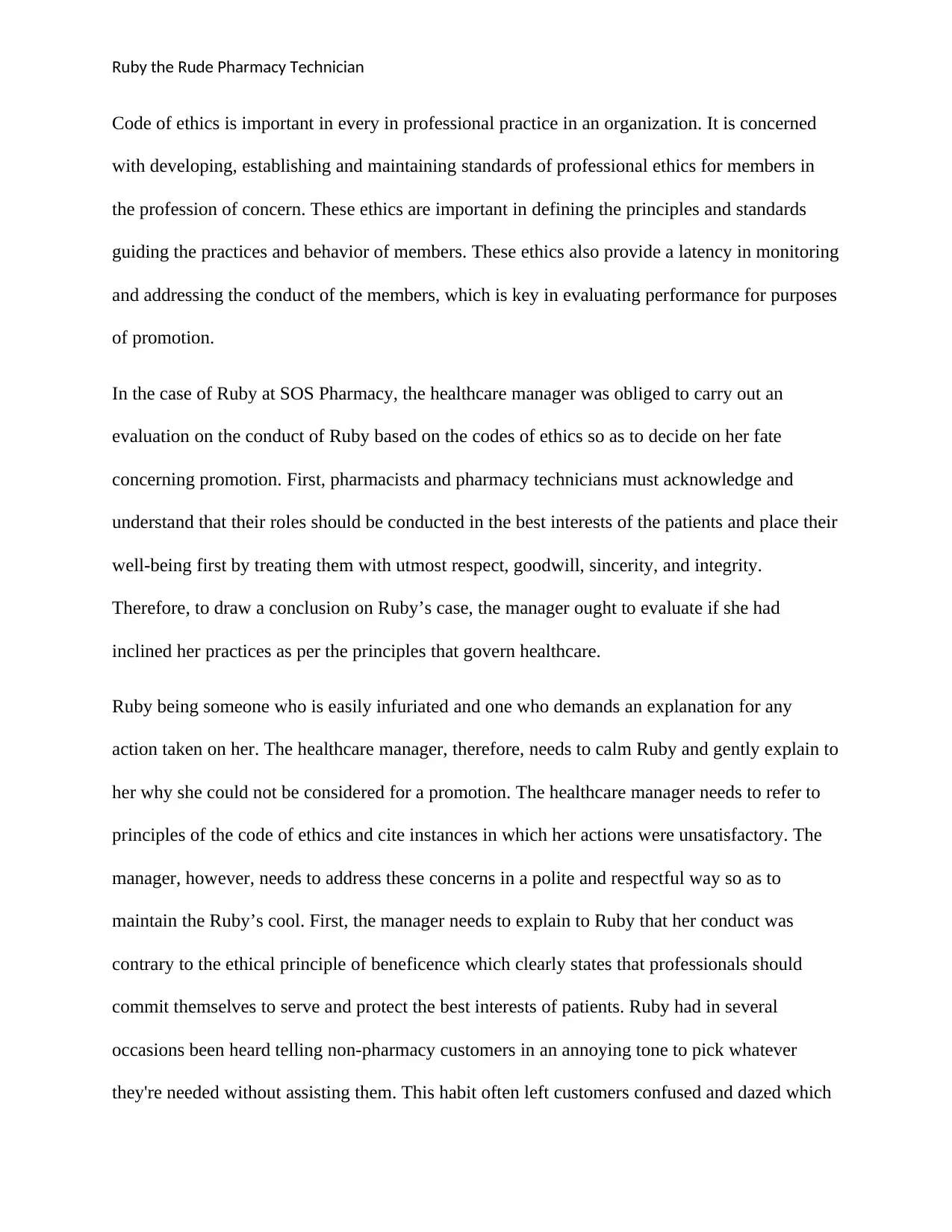
Ruby the Rude Pharmacy Technician
Code of ethics is important in every in professional practice in an organization. It is concerned
with developing, establishing and maintaining standards of professional ethics for members in
the profession of concern. These ethics are important in defining the principles and standards
guiding the practices and behavior of members. These ethics also provide a latency in monitoring
and addressing the conduct of the members, which is key in evaluating performance for purposes
of promotion.
In the case of Ruby at SOS Pharmacy, the healthcare manager was obliged to carry out an
evaluation on the conduct of Ruby based on the codes of ethics so as to decide on her fate
concerning promotion. First, pharmacists and pharmacy technicians must acknowledge and
understand that their roles should be conducted in the best interests of the patients and place their
well-being first by treating them with utmost respect, goodwill, sincerity, and integrity.
Therefore, to draw a conclusion on Ruby’s case, the manager ought to evaluate if she had
inclined her practices as per the principles that govern healthcare.
Ruby being someone who is easily infuriated and one who demands an explanation for any
action taken on her. The healthcare manager, therefore, needs to calm Ruby and gently explain to
her why she could not be considered for a promotion. The healthcare manager needs to refer to
principles of the code of ethics and cite instances in which her actions were unsatisfactory. The
manager, however, needs to address these concerns in a polite and respectful way so as to
maintain the Ruby’s cool. First, the manager needs to explain to Ruby that her conduct was
contrary to the ethical principle of beneficence which clearly states that professionals should
commit themselves to serve and protect the best interests of patients. Ruby had in several
occasions been heard telling non-pharmacy customers in an annoying tone to pick whatever
they're needed without assisting them. This habit often left customers confused and dazed which
Code of ethics is important in every in professional practice in an organization. It is concerned
with developing, establishing and maintaining standards of professional ethics for members in
the profession of concern. These ethics are important in defining the principles and standards
guiding the practices and behavior of members. These ethics also provide a latency in monitoring
and addressing the conduct of the members, which is key in evaluating performance for purposes
of promotion.
In the case of Ruby at SOS Pharmacy, the healthcare manager was obliged to carry out an
evaluation on the conduct of Ruby based on the codes of ethics so as to decide on her fate
concerning promotion. First, pharmacists and pharmacy technicians must acknowledge and
understand that their roles should be conducted in the best interests of the patients and place their
well-being first by treating them with utmost respect, goodwill, sincerity, and integrity.
Therefore, to draw a conclusion on Ruby’s case, the manager ought to evaluate if she had
inclined her practices as per the principles that govern healthcare.
Ruby being someone who is easily infuriated and one who demands an explanation for any
action taken on her. The healthcare manager, therefore, needs to calm Ruby and gently explain to
her why she could not be considered for a promotion. The healthcare manager needs to refer to
principles of the code of ethics and cite instances in which her actions were unsatisfactory. The
manager, however, needs to address these concerns in a polite and respectful way so as to
maintain the Ruby’s cool. First, the manager needs to explain to Ruby that her conduct was
contrary to the ethical principle of beneficence which clearly states that professionals should
commit themselves to serve and protect the best interests of patients. Ruby had in several
occasions been heard telling non-pharmacy customers in an annoying tone to pick whatever
they're needed without assisting them. This habit often left customers confused and dazed which
⊘ This is a preview!⊘
Do you want full access?
Subscribe today to unlock all pages.

Trusted by 1+ million students worldwide
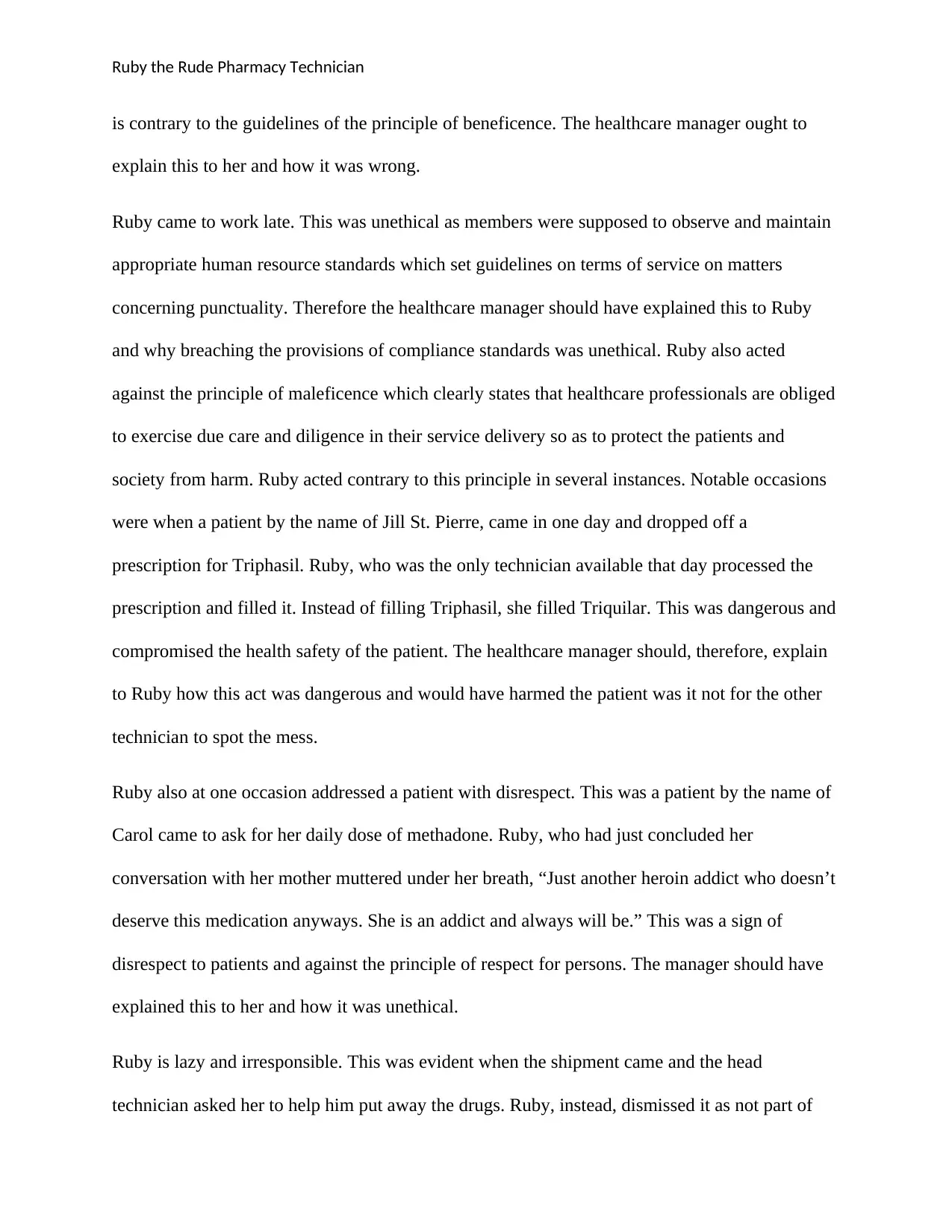
Ruby the Rude Pharmacy Technician
is contrary to the guidelines of the principle of beneficence. The healthcare manager ought to
explain this to her and how it was wrong.
Ruby came to work late. This was unethical as members were supposed to observe and maintain
appropriate human resource standards which set guidelines on terms of service on matters
concerning punctuality. Therefore the healthcare manager should have explained this to Ruby
and why breaching the provisions of compliance standards was unethical. Ruby also acted
against the principle of maleficence which clearly states that healthcare professionals are obliged
to exercise due care and diligence in their service delivery so as to protect the patients and
society from harm. Ruby acted contrary to this principle in several instances. Notable occasions
were when a patient by the name of Jill St. Pierre, came in one day and dropped off a
prescription for Triphasil. Ruby, who was the only technician available that day processed the
prescription and filled it. Instead of filling Triphasil, she filled Triquilar. This was dangerous and
compromised the health safety of the patient. The healthcare manager should, therefore, explain
to Ruby how this act was dangerous and would have harmed the patient was it not for the other
technician to spot the mess.
Ruby also at one occasion addressed a patient with disrespect. This was a patient by the name of
Carol came to ask for her daily dose of methadone. Ruby, who had just concluded her
conversation with her mother muttered under her breath, “Just another heroin addict who doesn’t
deserve this medication anyways. She is an addict and always will be.” This was a sign of
disrespect to patients and against the principle of respect for persons. The manager should have
explained this to her and how it was unethical.
Ruby is lazy and irresponsible. This was evident when the shipment came and the head
technician asked her to help him put away the drugs. Ruby, instead, dismissed it as not part of
is contrary to the guidelines of the principle of beneficence. The healthcare manager ought to
explain this to her and how it was wrong.
Ruby came to work late. This was unethical as members were supposed to observe and maintain
appropriate human resource standards which set guidelines on terms of service on matters
concerning punctuality. Therefore the healthcare manager should have explained this to Ruby
and why breaching the provisions of compliance standards was unethical. Ruby also acted
against the principle of maleficence which clearly states that healthcare professionals are obliged
to exercise due care and diligence in their service delivery so as to protect the patients and
society from harm. Ruby acted contrary to this principle in several instances. Notable occasions
were when a patient by the name of Jill St. Pierre, came in one day and dropped off a
prescription for Triphasil. Ruby, who was the only technician available that day processed the
prescription and filled it. Instead of filling Triphasil, she filled Triquilar. This was dangerous and
compromised the health safety of the patient. The healthcare manager should, therefore, explain
to Ruby how this act was dangerous and would have harmed the patient was it not for the other
technician to spot the mess.
Ruby also at one occasion addressed a patient with disrespect. This was a patient by the name of
Carol came to ask for her daily dose of methadone. Ruby, who had just concluded her
conversation with her mother muttered under her breath, “Just another heroin addict who doesn’t
deserve this medication anyways. She is an addict and always will be.” This was a sign of
disrespect to patients and against the principle of respect for persons. The manager should have
explained this to her and how it was unethical.
Ruby is lazy and irresponsible. This was evident when the shipment came and the head
technician asked her to help him put away the drugs. Ruby, instead, dismissed it as not part of
Paraphrase This Document
Need a fresh take? Get an instant paraphrase of this document with our AI Paraphraser
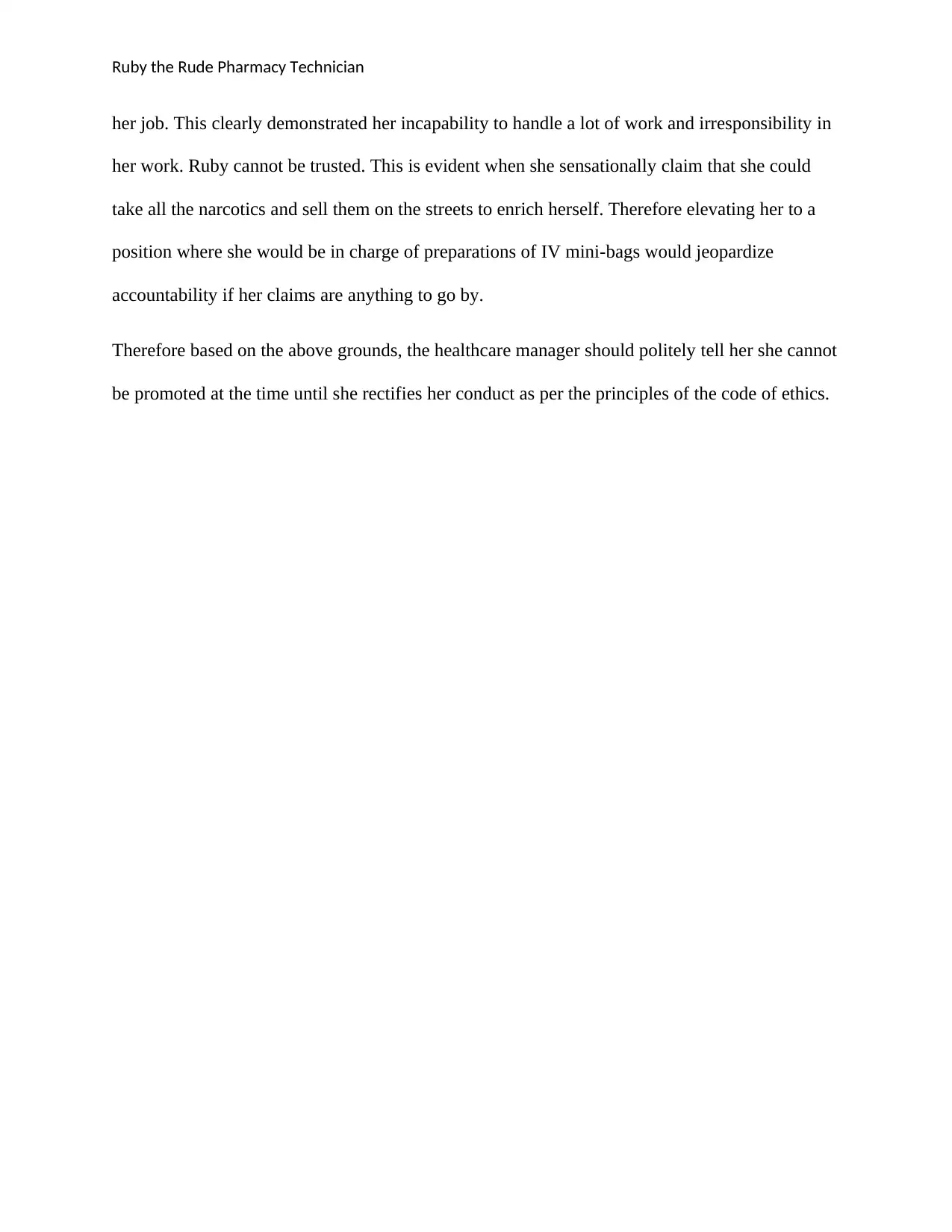
Ruby the Rude Pharmacy Technician
her job. This clearly demonstrated her incapability to handle a lot of work and irresponsibility in
her work. Ruby cannot be trusted. This is evident when she sensationally claim that she could
take all the narcotics and sell them on the streets to enrich herself. Therefore elevating her to a
position where she would be in charge of preparations of IV mini-bags would jeopardize
accountability if her claims are anything to go by.
Therefore based on the above grounds, the healthcare manager should politely tell her she cannot
be promoted at the time until she rectifies her conduct as per the principles of the code of ethics.
her job. This clearly demonstrated her incapability to handle a lot of work and irresponsibility in
her work. Ruby cannot be trusted. This is evident when she sensationally claim that she could
take all the narcotics and sell them on the streets to enrich herself. Therefore elevating her to a
position where she would be in charge of preparations of IV mini-bags would jeopardize
accountability if her claims are anything to go by.
Therefore based on the above grounds, the healthcare manager should politely tell her she cannot
be promoted at the time until she rectifies her conduct as per the principles of the code of ethics.
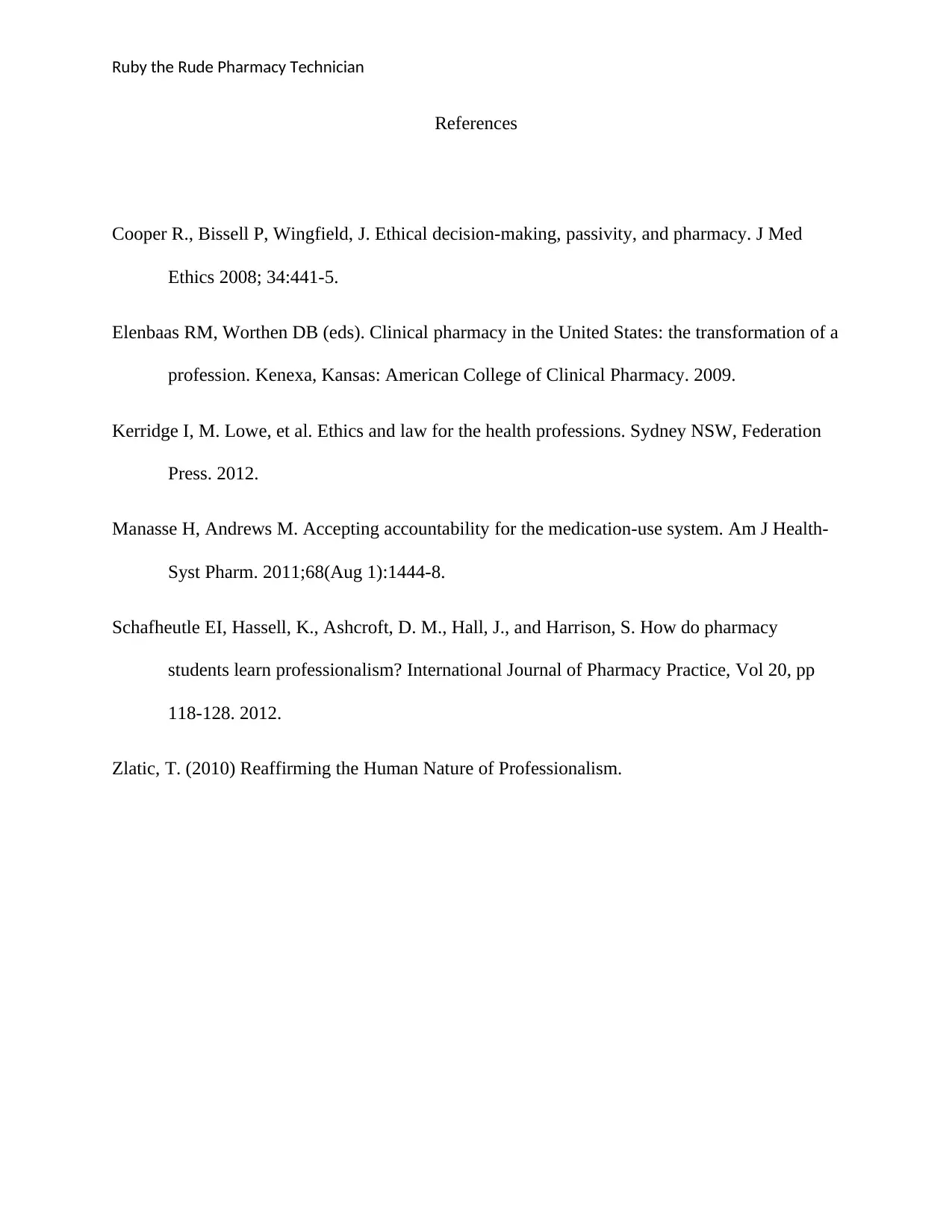
Ruby the Rude Pharmacy Technician
References
Cooper R., Bissell P, Wingfield, J. Ethical decision-making, passivity, and pharmacy. J Med
Ethics 2008; 34:441-5.
Elenbaas RM, Worthen DB (eds). Clinical pharmacy in the United States: the transformation of a
profession. Kenexa, Kansas: American College of Clinical Pharmacy. 2009.
Kerridge I, M. Lowe, et al. Ethics and law for the health professions. Sydney NSW, Federation
Press. 2012.
Manasse H, Andrews M. Accepting accountability for the medication-use system. Am J Health-
Syst Pharm. 2011;68(Aug 1):1444-8.
Schafheutle EI, Hassell, K., Ashcroft, D. M., Hall, J., and Harrison, S. How do pharmacy
students learn professionalism? International Journal of Pharmacy Practice, Vol 20, pp
118-128. 2012.
Zlatic, T. (2010) Reaffirming the Human Nature of Professionalism.
References
Cooper R., Bissell P, Wingfield, J. Ethical decision-making, passivity, and pharmacy. J Med
Ethics 2008; 34:441-5.
Elenbaas RM, Worthen DB (eds). Clinical pharmacy in the United States: the transformation of a
profession. Kenexa, Kansas: American College of Clinical Pharmacy. 2009.
Kerridge I, M. Lowe, et al. Ethics and law for the health professions. Sydney NSW, Federation
Press. 2012.
Manasse H, Andrews M. Accepting accountability for the medication-use system. Am J Health-
Syst Pharm. 2011;68(Aug 1):1444-8.
Schafheutle EI, Hassell, K., Ashcroft, D. M., Hall, J., and Harrison, S. How do pharmacy
students learn professionalism? International Journal of Pharmacy Practice, Vol 20, pp
118-128. 2012.
Zlatic, T. (2010) Reaffirming the Human Nature of Professionalism.
⊘ This is a preview!⊘
Do you want full access?
Subscribe today to unlock all pages.

Trusted by 1+ million students worldwide
1 out of 6
Related Documents
Your All-in-One AI-Powered Toolkit for Academic Success.
+13062052269
info@desklib.com
Available 24*7 on WhatsApp / Email
![[object Object]](/_next/static/media/star-bottom.7253800d.svg)
Unlock your academic potential
Copyright © 2020–2026 A2Z Services. All Rights Reserved. Developed and managed by ZUCOL.




